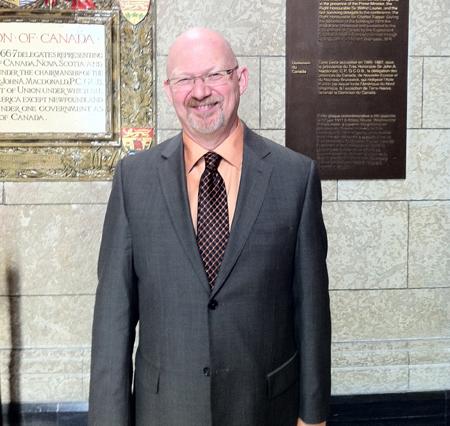Newly minted NDP MP Randall Garrison is no stranger to politics. Having run unsuccessfully in the BC riding of Esquimalt-Juan de Fuca in the 2004 and 2006 federal elections, Garrison served on municipal council before deciding to take the leap back to the federal stage. This at a time when several high-profile MPs left federal politics to return to the municipal scene.
“I really found there were a lot of things that we couldn’t address at the council table that I was still very interested in, so I decided to run federally again,” Garrison says. “Because Keith Martin stepped down, it was an open seat and a very tough fight. I ended up with a margin of 406 votes.”
For Garrison, those issues included poverty, especially among seniors, who were struggling to afford rising property taxes on fixed incomes, as well as students who were having difficulty finding affordable housing as tuition costs continue to rise.
“As a municipal councillor, you can’t address those,” Garrison says.
Garrison worked as a college instructor and an international human rights worker before making the leap to politics.
“I’ve been involved in community organizations in my community all my life, and that all came together in getting elected to the House of Commons, where I’m hoping to continue the same kind of work,” he says.
Now part of a caucus with three other out MPs, Garrison is looking forward to working with the other queer MPs.
“The four of us will have to get together and figure out exactly how we’re going to advance [queer] issues,” Garrison says. “I know that Libby [Davies] has submitted the trans rights bill, and it’ll be introduced at the first opportunity, and we’ll be pushing that again.”
Garrison says trans rights are the priority for him.
“For now, that’ll be where we put our biggest push, but obviously a more inclusive Canada includes us, and we’re going to make sure that we’re there at every opportunity,” he says.
As for what unique skills he brings to the table, Garrison points to his experience both locally and internationally.
“It’s very important for queers to be present and visible, and I’ve done that in international human rights work, including working in Afghanistan and Indonesia,” Garrison says. “I bring some of that experience at the broader international conflict level to the table, and that’s largely trying to find common ground with people who are a really long ways away from where you are.
“I hope those skills will serve me well here.”


 Why you can trust Xtra
Why you can trust Xtra


